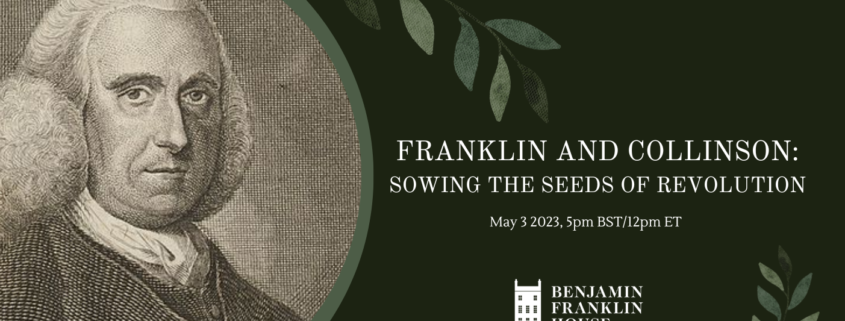Franklin and Collinson: Sowing the Seeds of Revolution
The garden has long been associated with this green and pleasant land. But who knew it could also germinate transatlantic politics?! Our Graduate Researcher in Residence, Alice Hopkinson, presents this online lecture on Benjamin Franklin and Peter Collinson in celebration of Royal Horticultural Society’s National Gardening Week!
Peter Collinson was an accomplished merchant, eager botanist, and one of Benjamin Franklin’s closest friends and allies. What was once initially quite a formal and respectable relationship quickly devolved into something more personal once the two came to realise their personal similarities, as well as their shared ambitions and interests. Throughout his life Collinson outwardly projected a noticeable selflessness, and like Franklin, became deeply interested in the intellectual culture of the American Colonies- seeing great potential in his fellow academics that were beginning to find their feet and settle their own intellectual authority in the evolving American Enlightenment. As such, he became Franklin’s Library Company’s greatest asset and heavily lent himself to supporting Franklin’s scientific pursuits.
Botany, both as a scientific discipline and hobby, was becoming increasingly popular in the eighteenth century and Collinson, as a merchant and a botanist, was one of the pioneers and instigators of a botany craze that shaped the state of British landscape gardening. By investing in his American colleagues and going to great lengths to promote the botanical prowess of the American Colonies, Collinson curated a reputation himself, and greatly contributed to a scientific correspondence exchange that would later lend itself to the minds of the American Revolution.
Despite his impressive list of achievements, Collinson was Franklin’s lesser known and less celebrated colleague. As such, this talk will acknowledge and give light to his often overlooked contributions, not only to Franklin’s career, but to botany, science and the promotion of American intellectualism as a whole.


